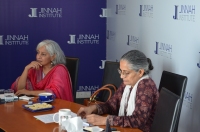Round Table
Activists discuss role of women in securing peace in South Asia
Date: July 12, 2013
Islamabad June 12, 2013: A round-table discussion on the role of Women in Conflict Resolution in Pakistan, India and Afghanistan, with Mahbooba Seraj, the Chairperson of the Afghan Women’s Network [AWN]) and Dr. Radha Kumar, Director General of the Delhi Policy Group, was held at the Jinnah Institute this Wednesday in Islamabad.
Participants from each of the three countries put forth their ideas and experiences of working for peace in the region. From Pakistan, Tahira Abdullah, a prominent rights activist and board member of the HRCP, Samar Minallah an anthropologist and documentary maker, and Mahvish Ahmad, a journalist and academic affiliated with Tanqeed.org.
Speaking about the efforts of the small number of women’s rights activists in Afghanistan, Mahbooba Seraj, explained why the AWN had resolutely remained politically neutral so as to not disrupt their efforts in representing each and every Afghan woman. She bemoaned the legal loopholes, which not only allowed organisations to indulge in pilfering funds but also undermined the efforts of other activists in her country. Seraj also pointed out a certain complacency in Pakistan towards Afghan affairs and concerns, and insisted that the current situation would push towards further conflict.
Dr. Radha Kumar, spoke about the need for greater people-to-people contact, and ways in which the peace process could be strengthened. Speaking on the issue of media jingoism on both sides of the border, she pointed out that while the Indian media had improved in its tone, there was still much work to be done.
Raza Rumi, the director of Jinnah Institute, pointed out the Institute’s efforts in conducting and maintaining contacts and talks between India and Pakistan, which have been particularly crucial during periods of diplomatic impasse. He expressed the Institute’s ambition to further include Afghan voices in such discussions as well.
The delegation of DPG and AWN are working on a report that looks at the role of Pakistani women in peace with India and Pakistan. Participants from Pakistan were asked to discuss what can be done to promote the peace process and encourage engagement among citizens in the region.
Participants from Pakistan were asked to discuss what can be done to promote the peace process and encourage engagement among citizens in the region.
Tahira Abdullah spoke on a range of issues, as well as answering queries by both the Indian and Afghan guests about Pakistani women and politics. Abdullah opined that a critical mass of voices from the civil society was needed in order to force the Pakistani military to reduce both its expenditure and its activities on both sides of the border. In her mind, such a situation, though currently inconceivable, was the surest route to peace in the area.
Mahvish Ahmed detailed her experiences of working with women student leaders in Balochistan, describing how separatist movements in the province had managed considerable success in politicising and mobililsing women. She also noted that religions parties had also experienced considerable success in this regard.
Emphasizing on the need to tell stories of women affected by conflict in the South Asia, Samar Minallah discussed how she had been attracted towards the stories of Afghan women refugees in Peshawar when she made her first documentary. Ms. Minallah was of the opinion that such voices needed to be heard, so that stereotypical opinions fostered by outsiders could be countered.

